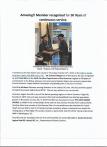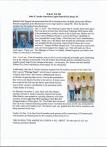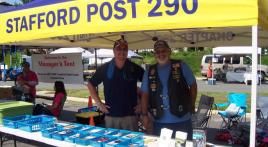Comments about his memories of the Army and Fort Jackson training, and the famous Tennessee hiking maneuvers, from Jack E. Marshall, to his wife Mildred, sons Michael, Gary, Dennis, and daughter Joyce, later in life
Army, rank of Private, 1943–1945,
stationed at Fort Jackson, S.C.
2nd Cavalry, Troop E, Mechanized, Reconnaissance, WWII
Born Dec. 19, 1923, and raised in Rankin, Ill., a farm boy
After being discharged from the army military, Jack moved to the Chicago area, got married, had four children and worked at the Western Electric Company. He also was part of the famous Hawthorne Studies at Western Electric Company that motivated employees and productivity, which he enjoyed being part of and talked to his sons about. He liked to bowl every week and was the president of the company’s bowling league. Jack also went to barber training school in Chicago, but found it difficult to stand on his feet for long periods of time due to his foot and ankle injury from the Army. Jack would cut hair and barber part-time in his house basement on weekends for friends and neighbors for extra money to help pay for his house improvement projects and some groceries for his large family. During the summer, most of the neighborhood boys got their summer short crew haircuts from Jack in his basement in a barber chair, and before restarting the local elementary school in the early fall, all would get another stylish hair cut with longer hair. Getting haircuts in Jack’s basement in his barber chair was part of the neighborhood.
In 1943, at 19 while at the farm, he was drafted into the Army and assigned to the 2nd Cavalry and Fort Jackson in Columbia, S.C., for training. While on maneuvers at Fort Jackson training with tanks and live ammunition, a tank’s live round (75 mm tank gun) hit a tree nearby, exploding, and a 1 ½” round hot piece of shrapnel hit Jack in the ankle and foot.
His memory of this was; “It felt like someone hit me in the ankle, foot and leg with a baseball bat real hard, burned a lot and I could smell burning flesh like cooking a hamburger on a hot grill. It knocked my legs out from under me and it hurt a lot. I was tended to by medics, then put onto a half track vehicle for a long, bumpy, painful ride back to base camp. Soon after I was transported to Oliver Army General Hospital in Augusta, Ga., Fort Gordon, for the first of three surgeries to remove the 1 ½ “ size tank shrapnel from my ankle and then rebuild ankle and bones. I still have the shrapnel and Army tan canvas leggings with a large shrapnel hole in them as a souvenir to show. Looking at it now, it is amazing that the doctors removed that shrapnel from my ankle and foot and I can still walk. Other surgeries following this were at Percy Jones Army General Hospital in Battle Creek, Mich. Doctors had to take skin off the cheek of my butt as a skin graft for my ankle and foot. I have the scar on my butt to prove it. Treatment for the wound was at the time a new experimental treatment using Sulfa/Sulphur. It is a good thing that this Sulfa/Sulphur worked, because doctors were considering amputating my foot if it didn't. I was in hospitals for 22 months with the multiple surgeries, leg casts and rehab to learn how to walk again. The nurses at the Army hospitals were all so nice and beautiful.”
“This same tank accidentally ran over another soldier who had slipped and fallen down in front of the tank during training; also the tank driver while learning to drive this tank had previously crashed into other Army vehicles in the motor pool, causing a lot of damage.”
“Tanks and training with them, tanks often ran through farm fields damaging land, fences and crops. The government reimbursed the farmers for all damages.”
“While training in live combat conditions, a fellow soldier somehow crawled over a live landmine and tripped the landmine, blowing up his midsection. I actually saw this.”
“Training was active, live and dangerous.”
“When training with tanks at night, we slept close to large trees to make sure that tanks traveling around did not run us over.”
“While I was having surgery rebuilding my foot and ankle, my Army unit and friends went over to Europe to Gen. Patton and the Battle of the Bulge. I wanted to go with them so bad but was not able to. Back then the officers and trainers who were with us during training went with the unit when transferred abroad to active duty and battle.”
“I am very proud of the big number 2 on my military patch and insignia, showing that I was part of the 2nd Cavalry Unit. We referred to it as The Big 2.”
“When I first got to Fort Jackson, officers were still wearing those fluffy cavalry jodhpurs riding horse pants. The Army was quickly transitioning over to mechanized. Within a few months, officers’ pants changed.’
“The well-known Tennessee Maneuvers, of a long strenuous hike with a heavy pack of over 125 miles, was a challenge. I was so proud to have been part of this great challenge and to be in the first group in our unit of over 800 to start on this hike, and I had the ability to complete it. So many others were not able to complete it and collapsed along the way. Along the way we slept in farmers’ barns. Southern people were so very nice and kind and gave the soldiers food. Soldiers offered money to pay for the food but Southern hospitality resisted taking soldiers' pay for food. Soldiers insisted on paying the farmers for the food because so many of the Southern farmers were poor.”
“On this four-day-long hike with full heavy backpacks, we walked 1 mile and then ran 1 to 2 miles, off and on. Our feet were so very sore from blisters. So many soldiers dropped out along the way and could not finish.”
“We drank water right out of streams and used sanitizing pills in our canteens.”
“We washed our cooking pots and gear in local streams with sand and small rocks for scrubbing.”
“Hiking and with backpacks on was frequent in our training. Sometimes we would hike from Fort Jackson to Myrtle Beach, S.C., over 100 miles, to camp right on the beach. This was my first time seeing the ocean. We would be brought back to Fort Jackson by truck.”
“During some of our training we slept in cotton fields.”
“I saw people picking cotton in the fields for the first time.”
“Training included being dropped off in fields in the middle of nowhere, far from everything, and we were to use stars and the sun to navigate and find our direction to hike back to camp.”
“We received training on building wood rafts and floating Army vehicles across rivers and creeks. Many rafts with vehicles sank in this training. I actually saw this happen.”
“I was trained to stand in the back of jeeps traveling fast and shoot a machine gun to hit targets while moving. I was good at this and was selected to help train this and help make training films of this. We trained on these jeeps with the tanks and the infantry.”
“I was good at shooting a rifle and was asked to help train others.”
“During my time at Fort Jackson, an officer came into our barracks and asked if anyone knew how to type and use a typewriter. I raised my hand and said I had a typing class once in high school. The officer said then you will also work in payroll here on the base and do some typing. Some of the soldiers were illiterate and could not read or write their names. They signed with an X. With some of the soldiers who messed up a lot and could not follow orders well, these soldiers got what was called ‘red lined’ which is delaying their pay some as punishment for messing up so much.”
“There was one soldier who urinated, wetting his bed frequently. We did not know if he had a medical problem or if he was just trying to get out and be discharged on purpose. The officers and training officers would exhibit and display his wet bed linens and blankets in public to embarrass him to encourage him to improve on this.”
“The summers were so very hot and there was no air conditioning back then. Mosquitos and bugs were so bad and dive bombed us all the time. The snakes were nasty.“
“The winters and cold weather were not good and we would warm our hands near the hot tail exhaust pipes of jeeps, trucks and vehicles.”
“At one time we were issued camouflage gear to train in, but soon after they took this away from us after they learned that German soldiers were using camouflage clothing, and this could be too confusing on the battlefield.”
“My father, your grandfather, at 44 was drafted right from the farm and into the Army, right before I was drafted. Your grandfather was assigned to Fort McCoy in Wisconsin, guarding Japanese prisoners of war at a camp. My older brother, your uncle, was drafted into the Navy since he worked in a local factory making baking pans and metal workers were needed in the Navy. He was stationed in the Marshall Islands in the South Pacific. He serviced naval ships coming back from battles to repair and also help remove both wounded and dead Navy crew.”
“As part of our military training, we received medical and basic first aid training. Later in life when working at the Western Electric Company in Chicago, a co-worker had an accident and severely partially cut off his hand and part of an arm from a large industrial fan and was bleeding out fast. I used my Army first aid training to immediately put a tourniquet on his arm to stop the bleeding. Medical personnel arrived soon after and took the injured worker to the hospital. My Army basic first aid training, I think, helped save this man's life.”
“Of the men in my unit who I trained with and who went to Europe and the Battle of the Bulge with Patton, not many survived and returned.”
“When I look at old photos of my Army unit, photos of being in the hospital, other Army photos and other Army things, it brings back a lot of memories and makes me think about a lot of things.”
“When I am asked how I survived Army training, being injured badly, the war and later in life survived several heart attacks, I just say I guess I am just lucky to be a survivor of all, in life.”
Later in his life, starting in his late 50s, he survived several serious heart attacks, bypass heart procedures, heart valve replacement and needed a heart pacemaker put in. In March 2001, at 77, Jack Marshall passed on. His physical heart was just too tired to go on even though mentally he was strong. Before his heart problems and even during them, he always was actively walking daily, even during winter with snow on the ground. He always promoted a lot of daily walking for better health. In his last couple of years with a failing heart getting tired, he was walking daily even if only up and down his house driveway several times a day and walking around the block, waving and saying hello to neighbors, up until his last day. Jack often commented about the long four-day, 125-mile hike with full heavy backpack of the famous Tennessee Maneuvers, how he successfully completed this and how other walks after thi, seem so very short compared to this.”
Written by:
Michael Marshall, Ph.D.
Son of Jack Marshall
Loganville/Atlanta, Ga.




